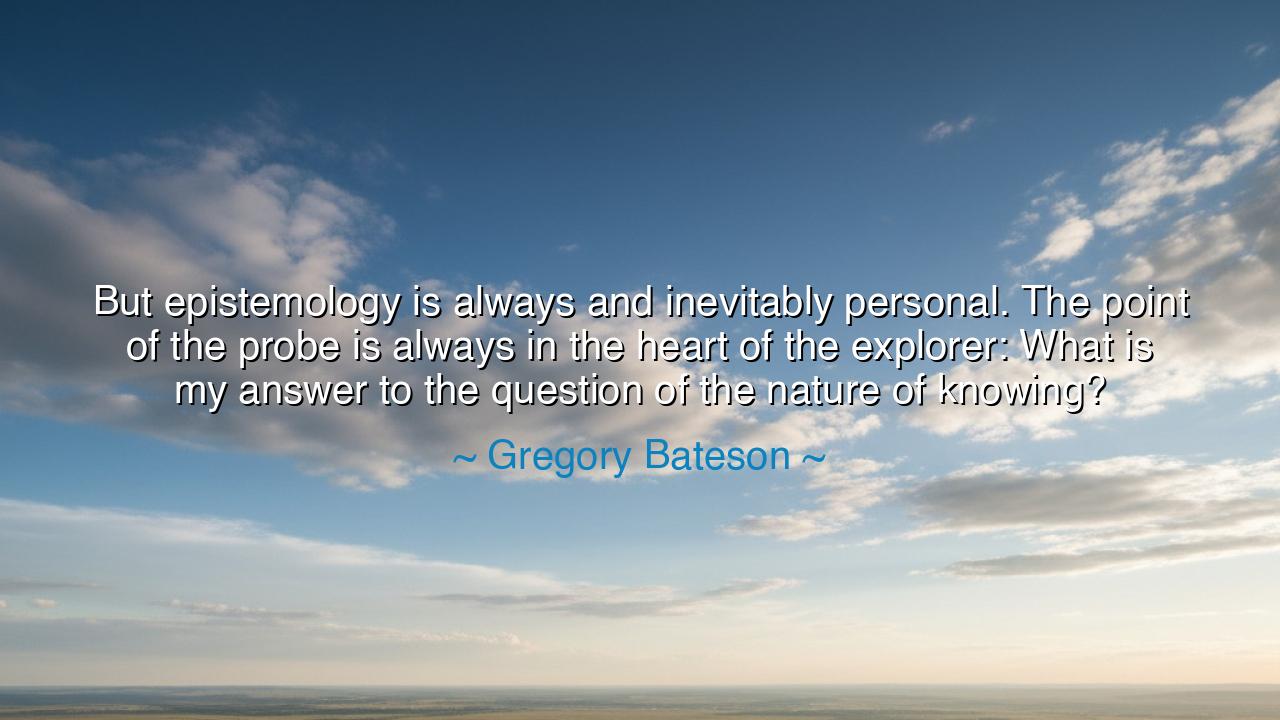
But epistemology is always and inevitably personal. The point of
But epistemology is always and inevitably personal. The point of the probe is always in the heart of the explorer: What is my answer to the question of the nature of knowing?






The anthropologist and philosopher Gregory Bateson spoke with clarity when he declared: “But epistemology is always and inevitably personal. The point of the probe is always in the heart of the explorer: What is my answer to the question of the nature of knowing?” Here, in these words, we are reminded that knowledge is not a cold stone to be lifted and measured, but a fire that burns differently in every soul. Epistemology—the study of knowing itself—cannot be separated from the one who seeks. Each question of truth is also a question of the self, and each answer reflects not only the world discovered but also the heart of the discoverer.
To the ancients, this was no strange thought. Socrates, in the marketplaces of Athens, pressed his disciples not merely with questions of fact, but with the deeper challenge: “How do you know what you claim to know?” His dialogues were less about victory and more about awakening the inner conscience, that personal reckoning with truth that each must undertake. For as Bateson affirms, the probe—the search, the inquiry—begins not in libraries or laboratories, but in the trembling heart of the seeker.
Consider the story of Galileo Galilei, who raised his telescope to the heavens and saw moons circling Jupiter. To many, the evidence was plain, yet to others it was heresy. Why the difference? Because knowing is never only about what lies outside; it is about the lens of belief, tradition, and courage within. Galileo’s answer to the question of knowing led him to confront power, to stand against the silence of centuries. His epistemology was personal, costly, and yet it opened the skies to humanity.
In Bateson’s teaching, there is a warning against pride. Too often men imagine that truth is impersonal, that they themselves are absent from the picture. But no, he says—the heart of the explorer is always present. A scientist may proclaim neutrality, yet his curiosity, his framing of the question, his acceptance or rejection of an answer—these all spring from his soul. The historian may gather facts, but the way he weaves them into story reveals his own values. The philosopher may define reason, but the passion that drives his search betrays a hunger deeper than logic. Knowledge is shaped by the knower.
This truth should not frighten us, but stir us to honesty. If every quest for knowledge begins with the explorer’s heart, then let each heart be pure. If we carry fear, we will discover reasons to doubt. If we carry arrogance, we will see only what glorifies ourselves. But if we carry humility, love of truth, and courage, our discoveries will reflect these qualities. Thus, the true preparation for knowledge is not only sharpening the mind, but also shaping the soul.
The lesson is plain: when you ask, “What is truth?” also ask, “Who am I as the seeker?” Let each of us probe not only outward but inward. In daily life, this means pausing before conclusions, testing whether our answers are born of honesty or of pride. It means daring to admit uncertainty, for uncertainty is the doorway to deeper wisdom. It means listening to voices not our own, that our hearts may be enlarged, and our epistemology may be made more whole.
Practical steps flow from this. Begin each search with humility, confessing that your vision is partial. Seek knowledge not only for victory, but for service. Keep journals of your learning, noting not only what you discovered but also what stirred within you as you discovered it. And above all, let your pursuit of knowledge be tied to love—for if truth is divorced from compassion, it becomes tyranny, but if truth is married to love, it becomes liberation.
Thus, Bateson’s words echo like the wisdom of prophets and philosophers: the point of the probe is always in the heart of the explorer. To know is not only to grasp the world, but to confront the self. And if we live as honest explorers, humble and courageous, then our knowledge will not merely build towers of intellect, but foundations of wisdom, strong enough to guide generations yet unborn.






AAdministratorAdministrator
Welcome, honored guests. Please leave a comment, we will respond soon